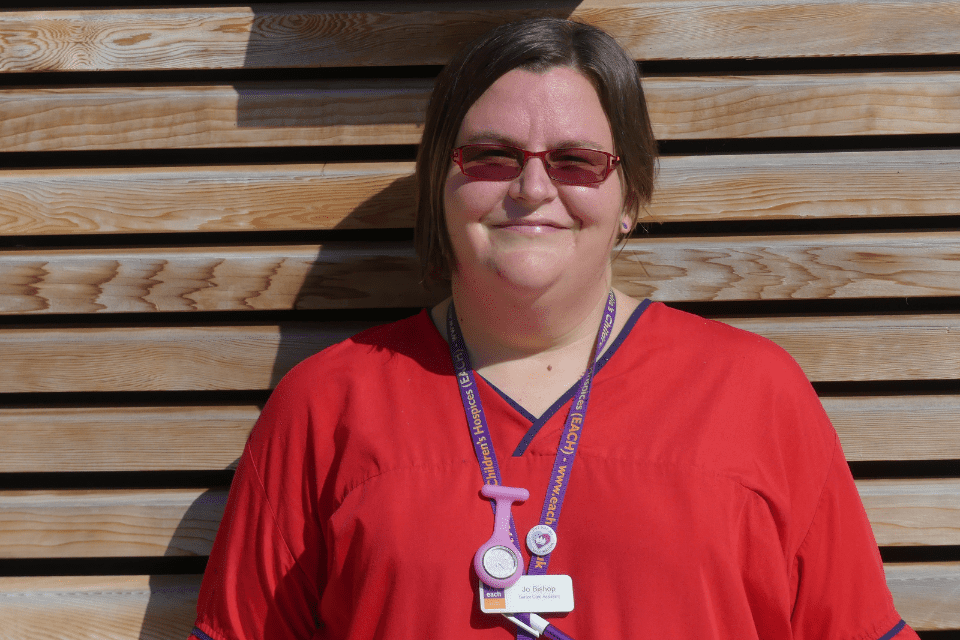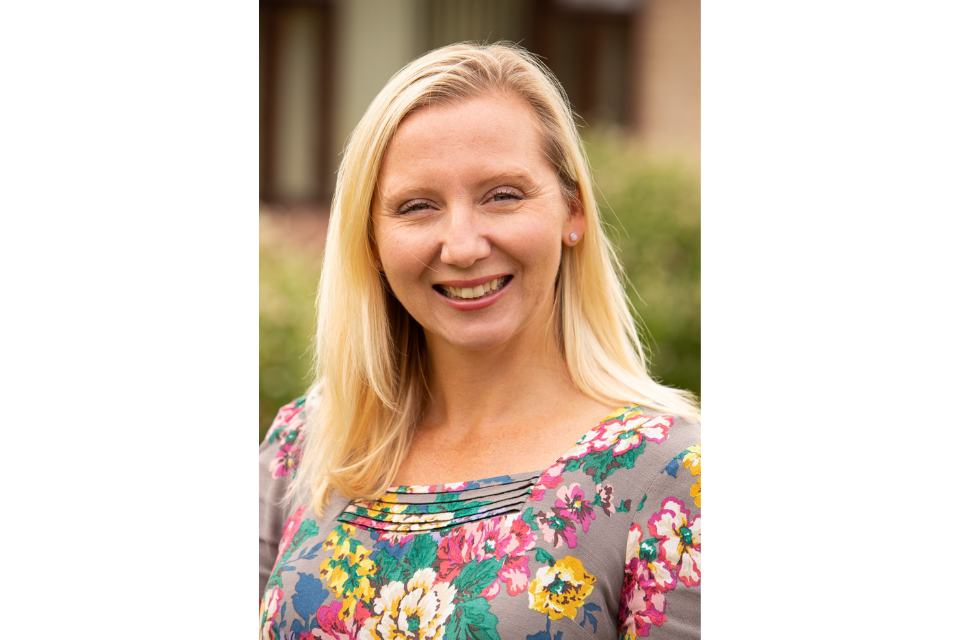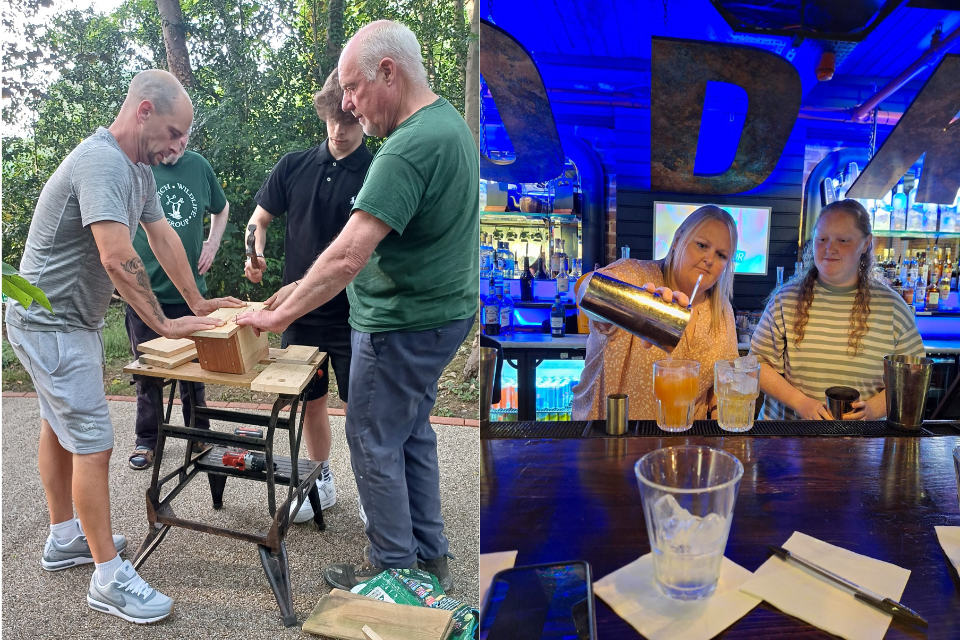By her own admission, Jo Bishop has already achieved her career goal by working for East Anglia’s Children’s Hospices (EACH). The Senior Care Assistant has had a burning desire to become part of the organisation since her childhood.
The 37-year-old is now an established part of the team at The Nook but her first encounter with EACH – a highly personal experience – came when she was just 15. Younger sister Caroline was born with a life-limiting condition and Jo and her mum visited the charity’s former Norfolk hospice at Quidenham.
It struck a chord with her and she declared there and then that it was her ambition to one day join the workforce.
“I absolutely loved it,” said Jo of her first impressions of Quidenham.
“It was so homely and felt amazing. Caroline never actually stayed at Quidenham. Our visit was more so we were aware of the hospice, to ensure the building was familiar to us and we knew where to turn, if we needed support.
“I remember saying to mum ‘I’m going to work here one day’ and she said ‘we’ve all got to have a dream’. Ever since, I’ve always said my ultimate end goal was to work for EACH.
“I never thought it would happen so early and not many people can say they’ve achieved their career goal by their 30s. It’s quite a scary thing to say, given I’m only halfway through my career.
“Working here has lived up to and exceeded my expectations and my friends tell me I don’t have to say how much I love my job – they can hear it in my voice. Part of the reason I love it so much is because every day is different.
“You could have exactly the same children with exactly the same staff but no two days are ever the same. That’s what makes it so interesting. Everyone is so amazing and everyone knows each other’s strengths and weaknesses.
“We work together as a team to support and promote each other, to ensure everyone works to the best of their ability. We tag team like that throughout the day.
“I also feel my experiences help me when talking to siblings, after their brother or sister has passed away. I can see things from their side. Having lived through a similar experience, I know how I felt and how they may feel and what helped and supported me. I’m prepared.
“I can then help as best I can and it’s very rare for someone to have experienced both sides of the coin. Sometimes that’s a massive advantage and sometimes it’s not. However, I’m able to recognise when it’s not and say ‘I can’t do this’.”
Jo was eight years old when her sister was born with mitochondrial cytopathy and cyclical vomiting syndrome, among other complications. It meant an alternative childhood for Jo but one that has stood her in great stead for her career with EACH.
“From a young age I used to help my mum look after Caroline,” she said.
“I really enjoyed looking after her. We shared the normal sisterly things like messing around and playing but I also liked caring for her. I used to set up her gastrostomy feeds from a young age if mum was at work, because it was too much for nan and grandad.
“It wasn’t the childhood most people had but, at the same time, I loved it and have so many wonderful memories. There were so many times where we were told my sister wouldn’t survive the night.
“Then we’d go in in the morning and she’d be kicking her legs around flirting with the doctors, fluttering her eyelashes as if to say ‘I’ve survived’. Some of those ‘next day memories’ really typified her spirit and character and are funny to look back on.
“Normal things like taking her shopping were so much fun, too. We had so much support from so many different people, because of my sister’s needs.
“As a result, I just wanted to help give other families a positive and supportive experience like we’d had.”
Caroline was 15 when she died in 2008. Jo describes it as a “kindness” in the end and, nine years later, she achieved her dream and started working for EACH. Prior to that, she had to work down the age scale before finally getting the chance to care for children and young people.
After leaving school she completed a childcare course but was unable to gain employment as she did not have enough experience. As a result, she started caring for the elderly.
“From working with a 104-year-old, I worked my way down the age scale and managed to get enough experience to eventually work for EACH,” said Jo, who lives in Beccles.
“Caroline actually passed away after having a stroke and at that time I was still caring for old people. On my first shift back, one of the people I was looking after had a stroke right in front of me. That was when I knew I couldn’t handle that kind of environment anymore.
“I moved onto Supported Living, which is for adults and young people with learning disabilities. It was live-in care and I loved it. When I first started working in a care home I remember someone saying ‘you don’t want to wipe bottoms and make tea for a living. You want to get a proper job’.
“I knew that was wrong and that care was so much more than that. Now that person is so proud of the fact I work for EACH. It’s so lovely hearing the difference.
“Sometimes I’ll go home and think about things that have happened during my day. I’ll think ‘wow’, it’s obviously affected me more than I thought it would.
“Then there are other times when, despite a family having had the worst possible day, if their child has passed away, I’m able to stay positive in myself. The reason is knowing we were able to help them create some amazing memories beforehand, and in some cases after they’ve passed too.
“Even something as simple as taking their baby for a walk in the pram for the first time. They might not have been able to do that without our help as they’ve been in hospital for a long time and it may not have been possible.
“I try to concentrate on those amazing things and the fact we were able to make their child comfortable right up to the end. To then be able to support the family afterwards, and help them say goodbye to their child, is a positive.
“It probably wouldn’t happen in a hospital in the same way, whereas here we can have it look like the child is asleep and the family can come in and out as many times as they like.
“They can spend as long or short an amount of time with them as they would like to. They’re the little things that I always try and focus on.
“If I struggle – and there was once instance where I really struggled – I can touch base with the wellbeing lead and say ‘I don’t know how to get through this one’.
“Away from work, I do a lot of cross-stich. I love it because you have to focus on what you’re doing, otherwise you prick your finger or make a mistake. It helps me consider things in a different way.”
Jo still thinks about her sister every day. Caroline’s memory burns bright and inspires her every time she sets foot at The Nook.
“I think about her all the time and the children often remind me of her,” she said.
“Some of the little things they do make me think ‘my sister did that’. Sometimes they have a twinkle in their eye just like Caroline.
“I learnt sign language to speak to her and half the children that come in sign to some degree, either because they’re deaf, have other communication needs or just like to sign. It’s really lovely to be able to have a conversation with them.
“I always describe my job as the best friend nobody wants. That sums it up perfectly. Nobody really wants to have our care because nobody wants their child to be poorly.
“However, when they find themselves in that situation, we, as an organisation, become their very best friend. I love it and can’t imagine doing anything else.”



